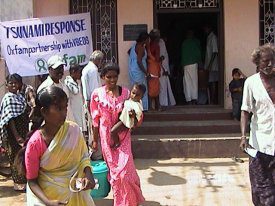Aditi Kapoor writes how some of the things she has seen will forever remain etched on her mind.
Dr Aditi Kapoor
Some things will forever remain etched on my mind. Like the unreal scene of a broken boat hanging precariously from the roof of a shattered house that had sunk into the hard ground; or the palm trees with their canopies turned forever – or so it seems – away from the sea. Mute witnesses to the force with which the tsunami killer waves had come and gone!
Then there are the faces. Prema, whose dazed expression, I knew, was asking me for help but she could hardly bring herself to talk to me. Prema had lost her husband to the tsunami, explained the woman who never let go of Prema’s hand. She wants help.” I felt utterly helpless. What help can I give her?” I asked, knowing even as I asked that it was a completely useless question. She wants her house back. And work,” I was told. That seemed to stir something in Prema. In a voice that was hardly audible, Prema said, My husband is gone. I need to look after my three children.”
The burden seemed to rest heavy on her. Not knowing the language, I could not converse directly with her. I looked into her eyes and nodded. Then desperately searched my mind for a suitable response. Please tell her that we are doing what we can,” I told the woman who stood protectively by her. We have just given these relief items that you had asked for. We are also in touch with the government to help it be more responsive to the affected people.”
 I was standing outside the Allayamkoatae relief camp organized by a church near Nagarcoil in district Kannyakumari, Tamil Nadu. Oxfam had just finished distributing a truck load of hygiene kits – buckets, mugs, bathing soap, washing soap, coconut hair oil (the favourite brand), comb, sanitary napkins, four pairs of women’s undergarments (while the older women were not in a habit of wearing these, there had been a lot of demand from the younger women) and footwear.
I was standing outside the Allayamkoatae relief camp organized by a church near Nagarcoil in district Kannyakumari, Tamil Nadu. Oxfam had just finished distributing a truck load of hygiene kits – buckets, mugs, bathing soap, washing soap, coconut hair oil (the favourite brand), comb, sanitary napkins, four pairs of women’s undergarments (while the older women were not in a habit of wearing these, there had been a lot of demand from the younger women) and footwear.
The process had been rather smooth as the volunteers had earlier made `family cards’ with all the details of the family and distributed these. So people had to only come with their card, put their thumb impression on the `muster roll’ or the signature sheet and take the bucket full of the utility items. After a similar exercise at the St Mary’s High School camp at Colachal, the most devastated area in Kannyakumari, Father Stanly, head of the camp, had remarked, People are very happy with these items. They say that finally someone has given things which are really useful.”
We are indeed trying our best but the road ahead is a long one. Yet, there are signs of satisfaction – like the way at least half-a-dozen of Oxfam’s former employees have rallied to help Oxfam. J. Thomas, finance professional, now works for a private firm but has taken a month off to work with Oxfam on tsunami relief. I wanted to join Oxfam when it responded to the Assam and Bihar floods earlier this year,” he confides. But I could not get leave. I will now try to extend my leave.” Then there is Devanand Londhe, a water and sanitation engineer who now works with RedR, the agency of engineers trained for disaster response. Deva – his former colleagues call him by this nickname, is handling water and sanitation facilities at the camps we are working in within the district. It is indeed good to see some familiar faces back with us. And heartening to realize Oxfam’s `spiritual’ strength that enables the faithful to flock to it in times of need.
These things will also remain etched on my mind.
Relief distribution in the village of Nadukalampet Nagapattinam. Credit Aditi Kapoor/Oxfam.



